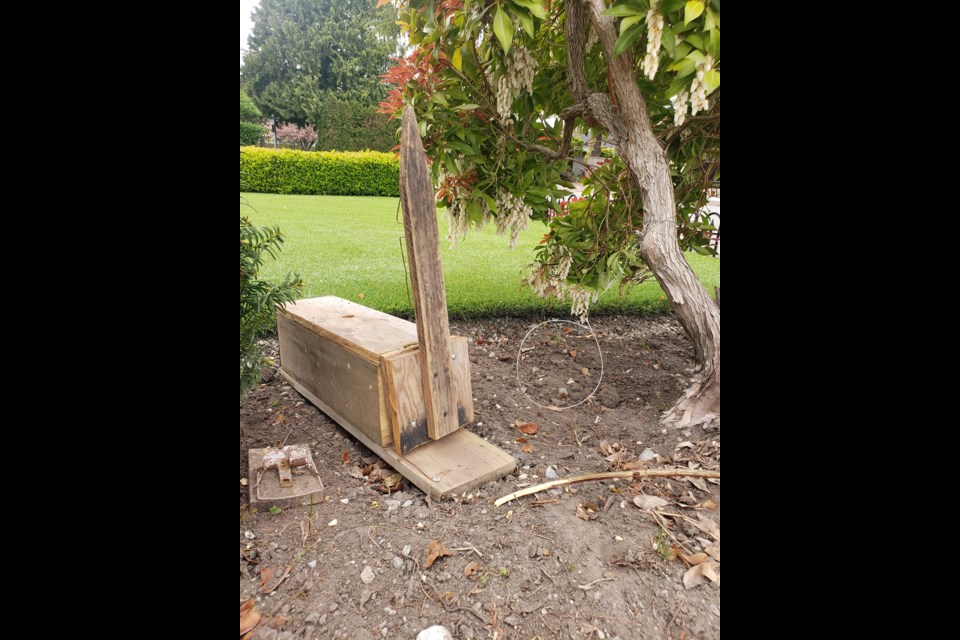Rabbit snares found on a Richmond property in the past week have raised safety as well as animal cruelty concerns in the neighbourhood.
Vancouver-based The Fur-bearers, an animal welfare organization, and Richmond’s Rabbitats Rescue Society received concerned calls of an injured rabbit with snare wire around its neck last week.
Lesley Fox, executive director of The Fur-bearers, an animal welfare organization, said Richmond residents also called to report seeing “dangerous snare traps” on one of their neighbour’s lawn.
The snare was homemade and had a noose-like wire so that the more the animal struggled, the tighter the wire would become.
“We found that the snare wire around this particular rabbit wasn’t from the home with the snares on its front yard, and we suspect it’s from another snare trap in the neighbourhood,” said Fox, adding that the rabbit had managed to bite off the wire and run into a neighbour’s backyard.
“Traps don’t need identification such as serial numbers or tracking mechanisms so when animals are found in traps, there’s no recourse.”
She said residents were also concerned of other possible snares and traps on other properties and homes in Richmond.
Donna Jones and her husband, whose residence had traps on their lawn, said the traps were placed “out of desperation,” but the couple has “learned their lesson.”
“We have been inundated with rabbits in our area and I guess my husband figured that (the snares) might be a deterrent,” said Jones in an email to the Richmond News, adding that the snares were taken away after an enforcement officer came to speak with them.
“Our neighbourhood has many rabbits which multiply quickly, and it’s also frustrating when you see people leaving carrots and lettuce out (to) feed them, so of course they stay in the area pooping all over our lawn.”
Fox told the News that snares are legal in certain areas, however, under the BC Wildlife Act, it is illegal to place a trap less than 200 meters from “any dwelling” such as a home or a place where people or pets can get caught.
Fox applauded local residents for calling in the injured rabbit and the snares immediately, which allowed the distressed animal to be treated by a veterinarian.
Sorelle Saidman, founder of Rabbitats, said the injured rabbit in this incident as well as another rabbit in a previous snare trap incident are now well and have been given medication.
However, the bill was not cheap, she said.
“We want to do what we can for the rabbits in the city, but we can only do so much with the limited amount of resources we have,” said Saidman.
“We’re footing the bill that’s about a couple thousand dollars just for these two incidents and that is not cheap for our organization.”
Warren Brundage, executive director of Suzaku Sanctuary Society from Surrey, said he was heartbroken when he saw the injured rabbit with the wire snare around its neck.
“Our rabbit rescue rarely comes across snares near residences or within the city, so this is a new thing for me,” said Brundage, who was also notified about the incident.
“The rabbit was distressed and in bad shape. And to add to it all, it was pregnant.”
Brundage said the rabbit was lucky and delivered its nine babies safely, but other animals or even children could have been injured.
According to Brundage and Fox, many residents were concerned for the safety of children and wondered if there are other hidden snares in other areas of the city.
“There have been cases in other cities where traps have injured adults, children and domesticated pets, and this resulted in lawsuits,” said Fox.
“It’s a bigger problem than just damaged city property.”
The News was told that city bylaws, BC SPCA and the BC Conservation Officer Services (BCCOS) were consulted in regards to the injured rabbit and the snares and a short investigation was conducted.
The BCCOS issued a statement on Tuesday, April 27 reminding the public about the use of wildlife traps.
“The Conservation Officer Service is reminding the public that it is illegal to set certain wildlife traps in residential neighbourhoods; specifically killing snares,” reads the statement.
While Richmond resident Jones said she has learned snares are not the solution, she hopes the City of Richmond can address the rabbit overpopulation issue in the city.
Fox, Saidman and Brundage all echoed Jones’ concerns that the city needs more regulations around rabbit breeders and owners, but also snare regulation and rabbit rescue funding.
“The City of Richmond should be addressing this problem, and other people I’ve heard from don’t feel like they’re doing it,” said Brundage.
“Ever since the city pulled their funding for local rabbit rescues, these organizations are overwhelmed and are at capacity to the point they can’t take anymore rabbits in.”
Fox added that she hopes to see more politicians and city council members bring up the issue of trap safety as well.
“There’s a larger system problem in areas with large amounts of rabbits, but there are better ways than to use kill traps such as using strategic fencing or evening gardening. It just requires a bit more care and creativity,” she said.
Rabbitats is expecting to meet with the city council in the coming weeks to discuss their agreement regarding rabbit rescue in Richmond.



